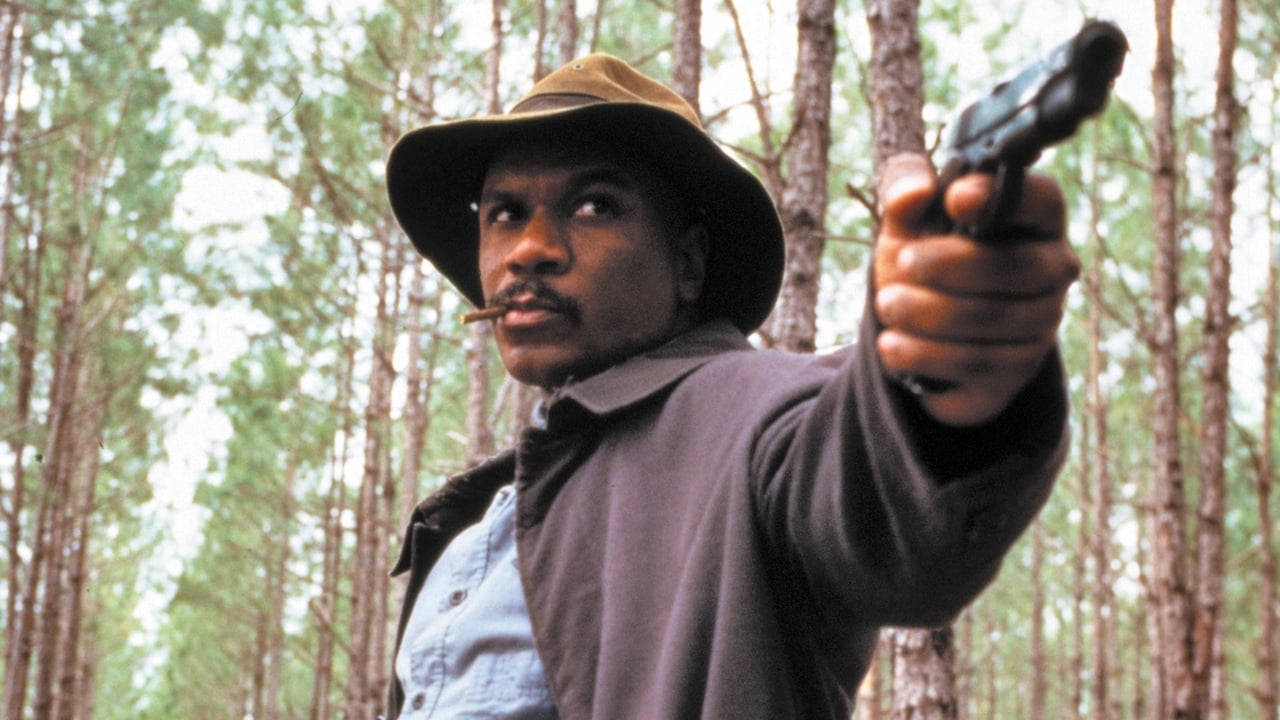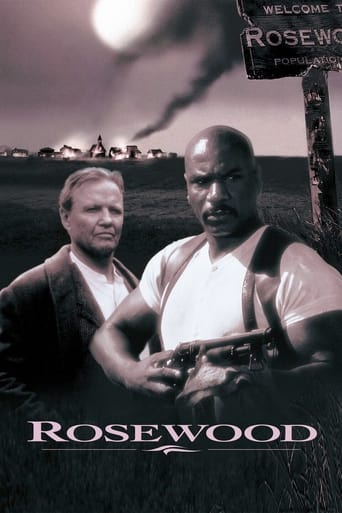



Beautiful, moving film.
A Brilliant Conflict
If you like to be scared, if you like to laugh, and if you like to learn a thing or two at the movies, this absolutely cannot be missed.
View MoreA clunky actioner with a handful of cool moments.
When something unspeakably shameful has happened in your nation's history, you must face it honestly, objectively placing blame where it belongs. But more important, you need to understand why it happened.That's what the film "Rosewood" tries to explain: How could it happen? It is not something easily explained in words, the darkness that can come over an entire community, turning people who might otherwise give you the shirt off their back into a rampaging, murdering mob. A sociologist might write a book; director John Singleton and writer Gregory Poirier take you back in time 90 years and put you in rural Florida, where you witness the events unfold.We see the county sheriff try, clumsily, to do his job, but things spin out of control. He suspects the truth, but what can he do? Later in the film he is accused by the judge of being too sympathetic to blacks. The judge probably was a member of the Ku Klux Klan, which show up later with their rifles and robes. Those in the mob who are not sufficiently violent are labeled "nigger lovers." Many of the rest are fueled by liquid courage. Even if someone had second thoughts and tried to stop it, the mob was out of control, and might have killed you. We see a church baptism group morph into a lynch mob, a reminder that most Christian churches in the South did little to oppose racism until recently.We see lynchings and a mass grave, combined with mutilations and body parts taken as souvenirs, and parents forcing their children to witness the lynchings. We see Voight as he watches McGill teach his son to make a noose as black homes burn around them. This is a portrait of Southern racism. "You've got to be taught."We see a poor white town neighboring a relatively affluent black town. Some reviewers are skeptical, but it seems plausible to me. There were substantial black-owned industries in Rosewood. (And there were other affluent all-black towns in America.) This resentment may well have intensified the racism. But how do you explain racism, itself? Fear and violence were essential to preserving segregation, which economically benefited whites, even, and especially, the poor white trash. We see some whites standing up against the madness: the armed men at the county line, the two train engineers, the Wrights.How closely do the events portrayed match history? When I looked online several years ago, it seemed, incorrectly, there were many discrepancies. (I wonder if reviewers were also misled.) I learned there were actually two black towns in the area that were destroyed by whites around the same period. John Wright was largely missing from that account, but not the current Wikipedia version:"Many survivors boarded the train after having been hidden by white general store owner John Wright and his wife, Mary Jo. Over the next several days, other Rosewood residents fled to Wright's house, facilitated by Sheriff Walker, who asked Wright to transport as many residents out of town as possible." It appears now from the Wikipedia article that the fundamental elements correspond surprisingly closely -- and the sheriff looks a bit more sympathetic. Still, when you watch a movie like this, "based on historical events," it is vital you read up on the true story. Some movies are 99 percent nonsense, like "Mississippi Burning" -- the actual case took an FBI agent about 15 minutes to solve. "Rosewood" is an exceptionally well-written film that brings you into the lives of the community and weaves together the story of their relationships smoothly and believably. You care about them by the time all hell breaks loose. The result is powerful, but not manipulative, cinema.The acting is very fine, down to the smallest roles, and sometimes exceptional, such as Bruce McGill, who plays the detestable racist drunk. (You hated him, didn't you?) With the beard you might not recognize him from Quantum Leap, where he played God in the final episode. McGill is the central figure among the racists, Ving Rhames ("Dave") anchors the story from the black side, while Jon Voight ("Odessa File," "Conrack") represents the white conscience, as weak and wavering as it is. Music is by the great John Williams (Star Wars, Indiana Jones, Harry Potter, etc.). Whether the movie perfectly matches the historical incidents perfectly is secondary. There were other Rosewoods in America, and I feel it is trying to tell their stories, too; you get the feeling they probably all follow a similar pattern: a false or exaggerated accusation by a white woman, etc. Florida during that period had the highest per capita rate of black lynchings of any state in the South. If anything, "Rosewood" may have understated the problem. But not all whites were racists. The problem was the Klan intimidated whites as well as blacks. But the bottom line is "Rosewood" is a brutally honest account of a shameful episode in American history. For that honesty, and that so much great talent came together to make this movie, I, as an American, am proud. For foreigners reading this review, I lived for many years in the South, including Florida, and I can assure you race relations have changed enormously (though all is not perfect), in part because we, as a nation, have been honest about our past. Look up the Rosewood Massacre online. Please read about the history of racism and the civil rights movement in America. That is the lesson I hope other nations will gain from this movie: If you are honest about your past, you no longer have to be ashamed of it.But there is more to be told. I hope that one day someone, perhaps John Singleton, will make a movie about Harry T. Moore, one of the great unsung heroes of the civil rights movement.
View MoreAn extremely emotional film. John Singleton did an excellent job with picture, and Gregory Poirier wrote beautifully with his dialogue. I felt as if the children actors were outstanding beyond belief. Maybe I'm giving this film a biased a review since I'm still excited having just watch it. However, this film is so powerful in it's teachings. It was veracious in it's character reactions and set. You end up hating characters with every fiber in your being, and you end up feeling so proud of those who exude so much courage. I was going to give a nine due to some parts I dubbed too 'Hollywood' for me, however I feel as if this movie's moral lessons have left a mark on my mind. The minuscule 'Hollywood' aspects in no way out-way the brilliance in every other manner.
View MoreLess than 100 miles away from me is a town that is a reminder of the hatred that exists in those who grew up in the rural South. I just read Olympia Vernon's book on a similar subject, so it is fresh in my mind. The inhumanity of man towards our fellow man is incomprehensible to me. Whether it is Schindler's List or Rosewood, it is hard to understand. We only have each other, and to think than any one of us is better than the other is pure crap.This film hits hard. It will move you to tears and anger you at how some people close by are seething with hatred. I would even go so far as to say that if it doesn't viscerally affect you, then you are either dead or part of the problem.The film itself features outstanding performances by Ving Rhames, Jon Voight, Don Cheadle, Esther Rolle and many others. Their work will hopefully inform the viewer of this great tragedy and remind them that it is not something in the past. Florida's election fiasco of 2000 and the aftermath of Hurricane Katrina serve as evidence that the State and federal government is full of racists who continue these acts today.
View MorePart of what makes "Rosewood" so hard to watch - but I recommend it very much - is not only that it really happened, but also the thought that the events portrayed may have partly been the root of what happened in Florida in 2000. With this vicious racism so deeply ingrained in our society, it's no surprise that Florida's government deprived a number of African-Americans of their right to vote. For more information about these sorts of things, read James Loewen's book "Lies Across America: What Our Historic Sites Get Wrong".But anyway, this is a great (and I would say under-appreciated) movie. Jon Voight, Ving Rhames, Don Cheadle, Michael Rooker and Muse Watson all do a great job in their roles. Definitely one of John Singleton's really good ones.
View More